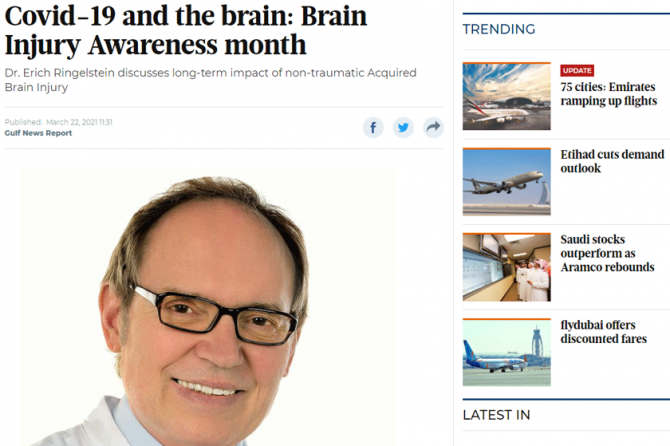
Covid-19 and the brain: Brain Injury Awareness month – Neurologist, Prof. Erich in Gulf News
Dubai: Every March, the Brain Injury Association of America (BIAA) leads dialogue around the crucial neurological topic of brain injury. This year’s theme, ‘More Than My Brain Injury,’ focuses on the lasting impact and the need for more understanding of brain injury as a chronic condition. Alongside conditions such as stroke and seizures, one of the main causes of non-traumatic Acquired Brain Injury (ABI) is infectious diseases. This includes COVID-19, for which the medical community is still getting to grips with a growing number of neurological manifestations.
In July 2020, authors for The Lancet acknowledged that: “although the predominant clinical presentation is with respiratory disease, neurological manifestations are being recognised increasingly.” What’s more, “neurological disease is also likely to be seen increasingly in patients who are SARS-CoV-2-positive but with few or no typical features of COVID-19”.
Neurological symptoms of COVID-19:
- Loss of smell
- Encephalopathy
- Encephalitis
- Acute disseminated encephalomyelitis and myelitis
- Guillain-Barré syndrome
- Ischaemic strokes
- Intracerebral haemorrhages
- Other cerebrovascular events
- Altered mental status
- Encephalitis
- Psychosis
- Neurocognitive (dementia-like) syndrome
- Affective disorder
Prof. Dr. Dr. Erich Ringelstein, Neurologist at Dubai’s German Neuroscience Center, said: “awareness of acquired brain injuries is more important this year than ever. In international research, and our direct experience in Dubai clinics, more lasting neurological complications of COVID-19 are becoming apparent. From mild symptoms, such as loss of smell to post-COVID stroke and other life-threatening conditions, manifestations are broad, with significant variations in severity.”
He added: “One of the main areas where more understanding is needed with any type of brain injury is its likelihood to develop into a chronic condition with lasting effects, long after the initial ‘recovery’. Chronic conditions require ongoing management as part of the continuum of care, as well as support for the mental health toll living with a chronic condition can take.”

